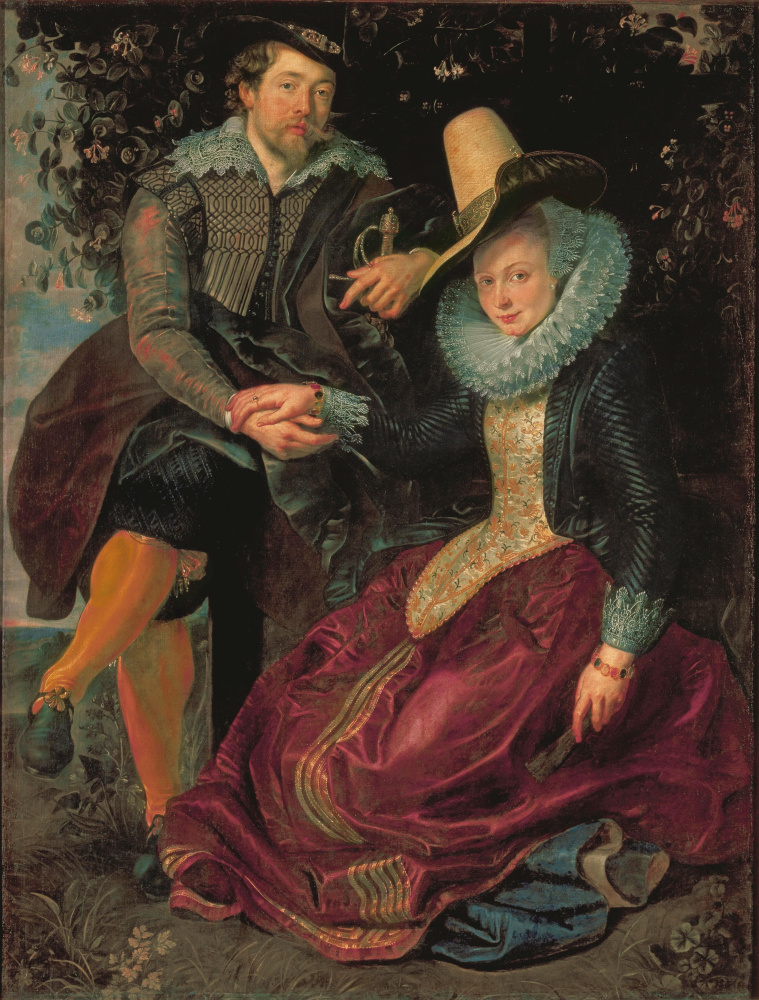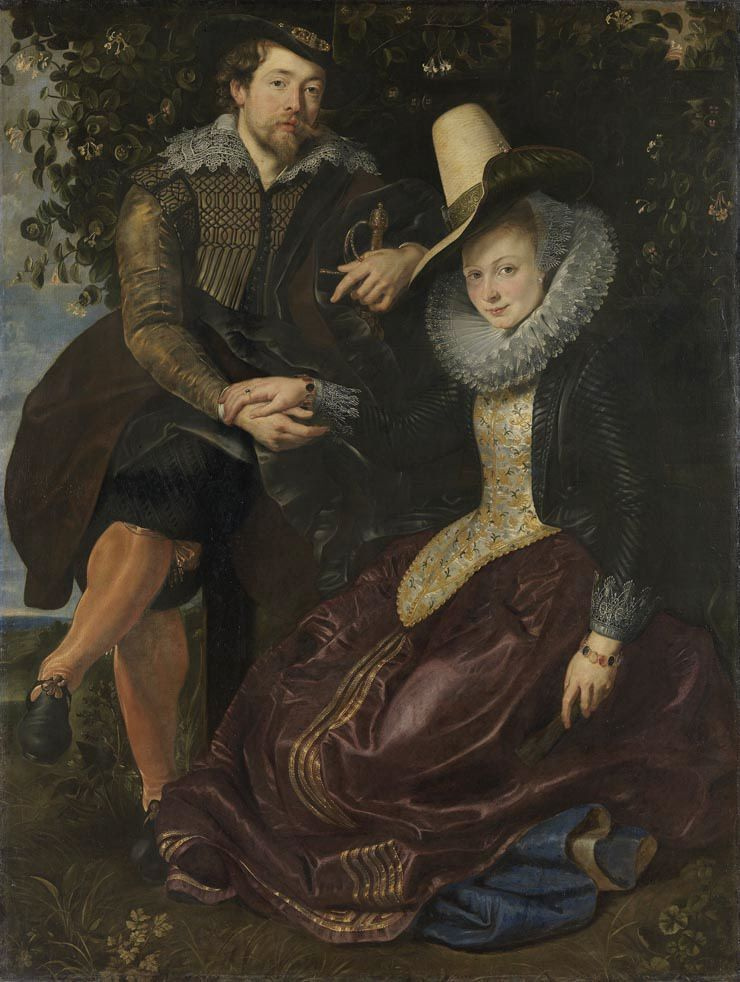log in
Enter site
Login to use Arthive functionality to the maximum
Self Portrait with Isabella Brant
Peter Paul Rubens • Malerei, 1609, 178×136.5 cm
Bildbeschreibung «Self Portrait with Isabella Brant»
When Rubens Phillip's older brother married, the artist said that he himself would never marry, because he could not find an equally worthy and perfect wife in all respects. But several years passed and a worthy lot was found for Rubens. And, literally in the next house. The niece of that very ideal woman, the wife of his brother, became the wife of a 32-year-old artist.
Isabella Brandt was 18 years old. Daughter of the Antwerp publisher of classical ancient authors, she was far from the circle of court secular beauties. Rubens avoided this circle all his life, even many years later, even when he was already a nobleman and a diplomat, the most famous European artist. But while Peter Paul is not rewarded with a noble title, he has nothing to do with politics and has not heard much about him at the European royal courts. He recently returned from Italy, where he spent 8 years at the court of Vincenzo Gonzaga and barely had time to appear before the archdukeAlbrecht and infanta Isabella. Soon Rubens will write their portraits and will be immediately accepted by the court artist, and on his own terms, with a monthly salary. Soon he will buy land in Antwerp and start building a huge house for his young, still childless, family.
Not surprisingly, young Isabella so quickly agreed to a marriage. Firstly, the biographers of Rubens are inclined towards an almost fabulous version of mutual love at first sight, and secondly, they are forced to recognize Rubens as an extremely positive and respectable character who has never been seen in a fleeting intrigue or windy love adventure.
Rubens's nephew recalled: “He rose at four o'clock in the morning, making it a rule to start a new day with a visit to Mass, unless he was tormented by the attack of gout, which pretty much poisoned his existence; then he went to work, sitting down a hired reader, who read out loud to him some good book, most often Plutarch, Titus Livius or Seneca. He loved his work more than anything else, and therefore he always arranged in such a way as not to experience inconvenience and harm to his health. For the same reason, he ate little. He feared that the smell of meat would not hinder his work, and, conversely, that work would not prevent the digestion of meat. He worked until five o'clock in the evening, and then saddled his horse and went for a walk around the city or to the fortress, or found another occupation that brought relief from worries. Upon his return, he was usually waited by several friends with whom he had dinner. He hated the abuse of wine and gluttony, like gambling. ”.
To such a perfect lifestyle, one should add the high education and visual appeal of the groom - and agree that Isabella Brandt was surprisingly lucky with her marriage. If we really try to find at least a small weakness in Rubens, considering the pair wedding portrait with Isabella, then you need to look at the artist's left hand. The hand calmly, confidently, even somehow casually, holds the hilt of the sword. That sword, which Rubens is not supposed to wear. Because he is not a nobleman. While not a nobleman. With all restrained, but persistent, rejection of the court circles, a categorical refusal to live in Brussels next to the Archduke, Rubens is vain. He writes a wedding portrait, surprisingly warm and happy, and at the same time declares a plan of his own actions for the near future. The plan is to be an artist, to achieve such a noticeable success that the monarch will grant him nobility and recognizes him as worthy of wearing a sword along with nobles, heroes and politicians.
Author: Anna Sidelnikova
Isabella Brandt was 18 years old. Daughter of the Antwerp publisher of classical ancient authors, she was far from the circle of court secular beauties. Rubens avoided this circle all his life, even many years later, even when he was already a nobleman and a diplomat, the most famous European artist. But while Peter Paul is not rewarded with a noble title, he has nothing to do with politics and has not heard much about him at the European royal courts. He recently returned from Italy, where he spent 8 years at the court of Vincenzo Gonzaga and barely had time to appear before the archdukeAlbrecht and infanta Isabella. Soon Rubens will write their portraits and will be immediately accepted by the court artist, and on his own terms, with a monthly salary. Soon he will buy land in Antwerp and start building a huge house for his young, still childless, family.
Not surprisingly, young Isabella so quickly agreed to a marriage. Firstly, the biographers of Rubens are inclined towards an almost fabulous version of mutual love at first sight, and secondly, they are forced to recognize Rubens as an extremely positive and respectable character who has never been seen in a fleeting intrigue or windy love adventure.
Rubens's nephew recalled: “He rose at four o'clock in the morning, making it a rule to start a new day with a visit to Mass, unless he was tormented by the attack of gout, which pretty much poisoned his existence; then he went to work, sitting down a hired reader, who read out loud to him some good book, most often Plutarch, Titus Livius or Seneca. He loved his work more than anything else, and therefore he always arranged in such a way as not to experience inconvenience and harm to his health. For the same reason, he ate little. He feared that the smell of meat would not hinder his work, and, conversely, that work would not prevent the digestion of meat. He worked until five o'clock in the evening, and then saddled his horse and went for a walk around the city or to the fortress, or found another occupation that brought relief from worries. Upon his return, he was usually waited by several friends with whom he had dinner. He hated the abuse of wine and gluttony, like gambling. ”.
To such a perfect lifestyle, one should add the high education and visual appeal of the groom - and agree that Isabella Brandt was surprisingly lucky with her marriage. If we really try to find at least a small weakness in Rubens, considering the pair wedding portrait with Isabella, then you need to look at the artist's left hand. The hand calmly, confidently, even somehow casually, holds the hilt of the sword. That sword, which Rubens is not supposed to wear. Because he is not a nobleman. While not a nobleman. With all restrained, but persistent, rejection of the court circles, a categorical refusal to live in Brussels next to the Archduke, Rubens is vain. He writes a wedding portrait, surprisingly warm and happy, and at the same time declares a plan of his own actions for the near future. The plan is to be an artist, to achieve such a noticeable success that the monarch will grant him nobility and recognizes him as worthy of wearing a sword along with nobles, heroes and politicians.
Author: Anna Sidelnikova



